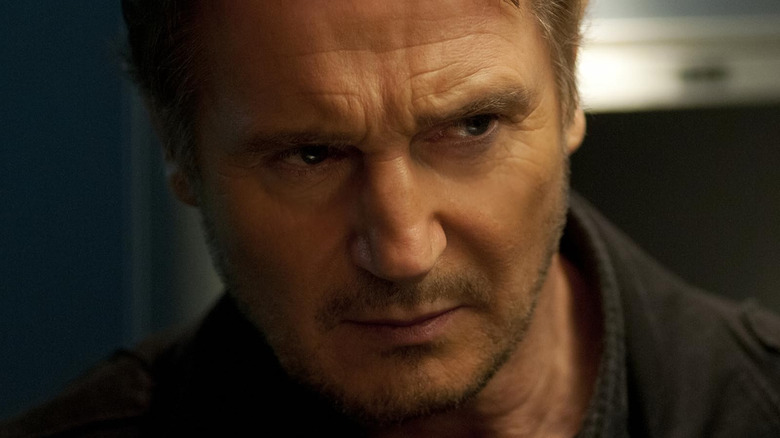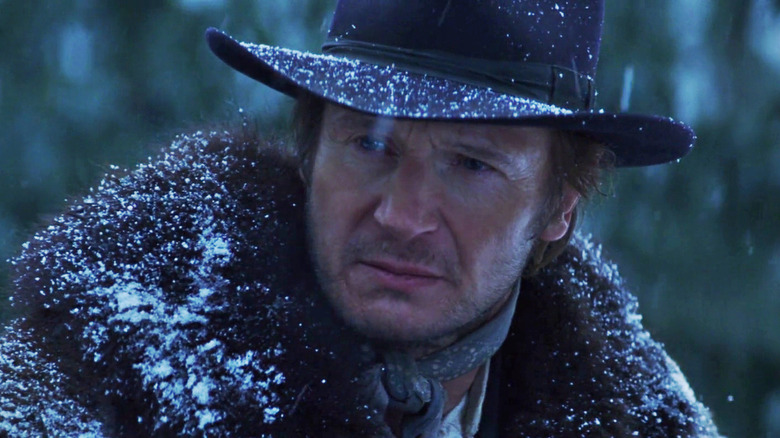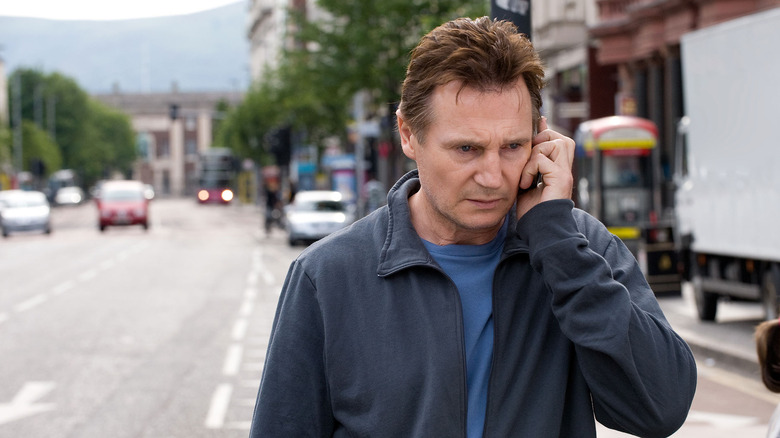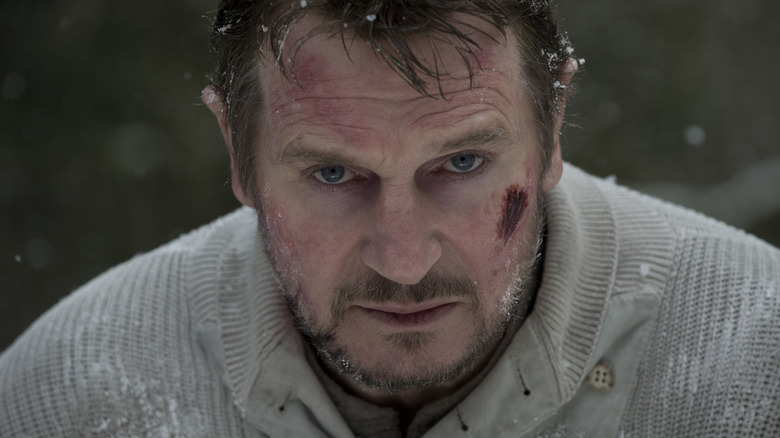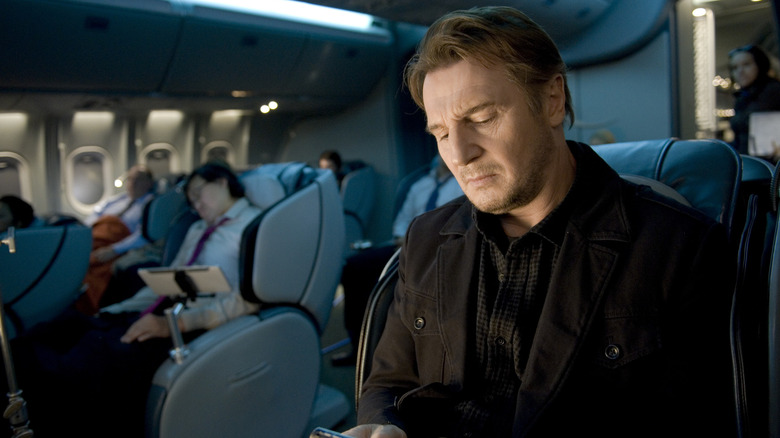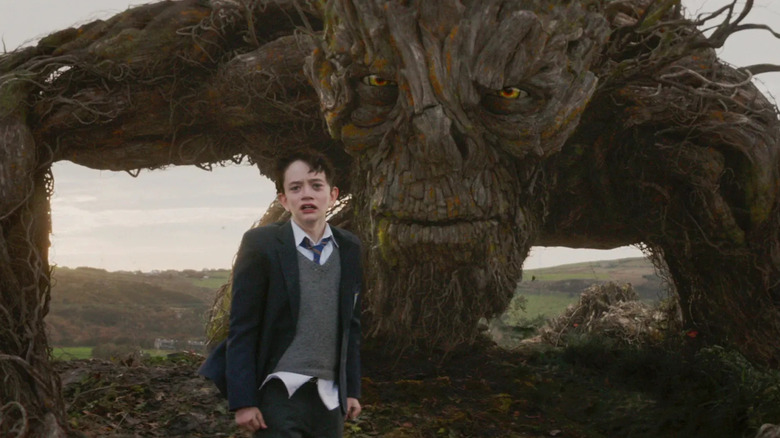5 Underrated Liam Neeson Movies Every Fan Needs To Watch
"Schindler's List," "Star Wars: Episode I — The Phantom Menace," "Taken," and "Batman Begins" are really just the tip of the iceberg in the fruitful and long acting career Liam Neeson has had so far. Easily one of the best of his generation, the Northern Ireland-born actor's prowess and versatility are nothing short of astonishing. Few things demonstrate that better than the fact that at 73, Neeson is now starring in 2025's "The Naked Gun" as Lt. Frank Drebin Jr., the son of Leslie Nielsen's immortal buffoonish detective in the spoof comedy franchise. Ever since his career began in the late 1970s, Neeson has portrayed controversial and unforgettable historical figures, superheroes, mentors, worrying fathers, and even skilled killing machines among a vast array of other characters in over 100 features.
As unlikely as it sounds, Neeson became an action star at the age of 56 with 2008's "Taken" (courtesy of director Pierre Morel and co-writer Luc Besson), and his cheap thrill low-to-mid-budget one-man-kills-all action flicks are still coming today with no end in sight. Regardless of the rather poor quality of many of those films, one thing's certain: Neeson is having fun. Frankly, he can afford it after all the classics he's given us over the decades. As such, we're here to handpick five of his movies that haven't gotten enough attention or are otherwise overlooked and underrated in a long-lasting career filled with stone-cold bangers.
Seraphim Falls
Despite his multifaceted roles in various genres, Neeson has mostly avoided Westerns, which is what makes David Von Ancken's "Seraphim Falls" all the more of a gem. It's the only horse opera in the actor's filmography (not counting Seth MacFarlane's Western parody "A Million Ways to Die in the West"), and it's a movie that certainly hasn't gotten enough praise over the years (likely in large part because it was a box office flop).
More of a character study than a traditional oater, "Seraphim Falls" is a cat-and-mouse chase between two broken men connected by their past in the American Civil War. The bare-bones plot is a two-hour pursuit between Colonel Carver (Neeson) and Gideon (Pierce Brosnan), as the former viciously tries to hunt and capture the latter with a small group of hired hands, traveling across rough terrain (from mountains to valleys to deserts) to exact his revenge over a horrible atrocity we only fully learn about near the end. Mind you, there are no big twists here; in fact, the simplicity of the narrative is what allows Neeson and Brosnan to completely take over and permeate the film's mood with an alluring and tragic melancholy, elevating it to a higher level. The action is raw and brutal (almost everything and everyone gets shot here at some point) with little mercy to hand out, but there's also a heartfelt lamentation on loss that subtly turns "Seraphim Falls" into a much deeper and thought-provoking piece of work than it initially seems. That's especially the case when it comes to its unusual ending, which I won't spoil here.
Five Minutes of Heaven
Oliver Hirschbiegel's part-historical, part-fictional psychological drama is one of those mood pieces that's a challenging watch. It's somber, sad, and slow, requiring close and undivided attention, but if you find just the right time to see it, the rewards can be plentiful. In truth, I haven't seen this movie in over 16 years, but as a young adult in 2009, its heavy story and brilliantly layered performances made an impression on me that I haven't forgotten since.
"Five Minutes of Heaven" reconstructs the 1975 killing of Jim Griffin (19) by Ulster Volunteer Force (UVF) leader Alistair Little (Mark Ryder/Liam Neeson) during The Troubles in Northern Ireland. Although the first half of the movie shows us that timeline, the more intriguing part comes 33 years later when Little, out of prison, is set to meet Joe Griffin (Kevin O'Neill/James Nesbitt), the younger brother of Jim, who witnessed the murder of his sibling all those years ago. The meeting is supposed to be televised by the media in the hope of reconciliation, but things don't exactly go according to plan — since Joe's main objective is to kill Little to avenge his brother's death. Whether he can go through with it is another question.
Neeson is superb here as the older Little, a changed man who factually recalls what it was like to be a member of the UVF, spreading hatred, violence, and killing Catholics as if it were his life mission. It's clear this role had a vital importance to Neeson, and he drew from his Irish roots to deliver a sobering and devastating portrayal.
The Grey
When Joe Carnahan's "The Grey" came out in 2012, I remember many people being disappointed since it wasn't another action-filled shoot-'em-up in the vein of "Taken." Seeing its audience ratings today, I'm not sure whether that perception has changed, but it definitely should. Although the trailers are terribly misleading, "The Grey" is a riveting survival thriller with a philosophical and emotional underpinning that serves as a meaningful core, as opposed to being another by-the-numbers action flick against the elements. Neeson's macho melancholy is used to great effect here, and the film rides on his compelling and tragic central performance as a depressed and despondent man forced to fight for survival.
The plot follows John Ottway (Neeson), a sharpshooter who protects the all-male staff of an oil company at a remote facility in the Alaskan wilderness. As a recent widower, he's dispirited and even considers suicide, but ultimately decides against it. The next day, as he and his fellow workers take a plane to fly back to Anchorage, the engine malfunctions and causes them to crash-land in the middle of nowhere. Ottway and six other men survive, and we follow them as they try to evade a pack of wolves and make it back to civilization.
"The Grey" is nothing like Neeson's other actioners, which is a good thing because Ottway's role requires a lot more from him than simply delivering another routine-like performance. Here, he's a vulnerable and relatable protagonist who doesn't necessarily win the day, but he's okay with that, too. If you missed or misjudged this movie back then, don't hesitate to give it another chance.
Non-Stop
Out of the numerous B-flicks that "Taken" spawned (and trust me, there are more of them than one can handle), Jaume Collet-Serra's 2014 thriller "Non-Stop" is among the better ones (of which there are very few). Plot-wise, it's almost as implausible and cliched as the rest, but Neeson's magnetic tough-as-nails charisma, combined with a capable cast (Julianne Moore, Shea Whigham, Lupita Nyong'o, Corey Stoll, etc.) and solid direction, makes this a sort of pearl in the mud. It's nowhere near as engaging and satisfying as Bryan Mills eliminating the Albanian mafia across Europe to save his daughter, but it's an entertaining-enough flick from a time before playing such a protagonist became a dull routine for Neeson.
In "Non-Stop," he plays Bill Marks, a U.S. Air Marshal and ex-NYPD officer who's on a transatlantic flight from New York to London when he receives an ominous message on his phone, claiming that a passenger will die every 20 minutes unless $150 million is transferred to a specific bank account. It doesn't take long for chaos to ensue, including the accusation that somehow Marks is behind all the shenanigans, and Neeson quickly switches into badass mode to find the criminal mastermind responsible and deliver as many blows and headshots as he needs to until the situation is resolved. And of course, you can't make a plane movie without a crash landing somewhere down the line.
A Monster Calls
Spaniard filmmaker J.A. Bayona's "A Monster Calls" can hardly be called underrated (much less forgotten), but I believe Neeson's pivotal performance/voice acting as the wise yet intimidating Yew Tree Monster certainly is. The 2016 film is one of the best fantasy dramas — one based on an equally engrossing book written by Patrick Ness — about grief and the pain of losing a parent to terminal illness. The plot follows Conor O'Malley (Lewis MacDougall), a 12-year-old English boy whose mother is rapidly dying of cancer. His way of coping is through drawing; from there, an imaginary world is born in his mind, wherein a yew tree comes alive to help him with his emotional suffering and to accept the loss he'll have to face soon.
"A Monster Calls" is a film that employs its spectacular visuals in service of conveying complex emotions to break your heart and then heal it with kindness and love. Both its storytelling and execution are intelligent and poignant, daring to go as deep as they need to, and exposing the hardest of truths a child can face. MacDougall is simply brilliant (a revelation, truly) as Conor, playing out his heart and soul in every scene that demands the purest of emotions. And Neeson's deep, baritone voice with pitch-perfect emphasis complements him every step of the way. In the film's distressing but moving ending, it's his voice that also soothes and comforts the tears running down your cheek like a warm blanket.
